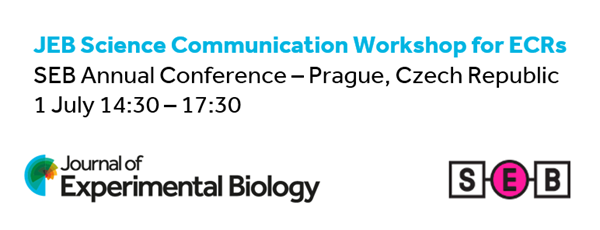A career as an academic research scientist is not an easy option and, in order to succeed, those venturing along this path need to combine their scientific knowledge and expertise with plenty of determination, dedication, resilience and, occasionally, good luck. Today's early career researchers (ECRs) – who will be responsible for shaping the future of scientific discovery – face challenges that are both similar and different to those of their predecessors. They are not only the newest wave of emerging researchers but also the largest – which is why, when we decided to launch our new interview series ‘Conversation’, we wanted to kick it off by focusing specifically on this next generation of scientists.
The Conversation article featuring Caroline Williams, in this issue of JEB (2133–2135), is the first in this new series, in which we aim to share the thoughts and insights of ECRs (who we have defined as graduate students, postdoctoral researchers or junior faculty within 10 years of being awarded their PhD). In addition to talking about their current research interests, interviewees discuss how they got to where they are today and the hurdles they have faced along the way. They provide advice to other graduates about to embark on this journey and talk about wider issues in research and publishing and what they think will and should change in the future.
As a community journal, JEB is keenly aware of many of the challenges facing this current generation of future leaders and has a long-standing record of supporting ECRs in the fields of comparative physiology and biomechanics. For example, the Inside JEB section – highlighting papers published in the journal and revealing the people and work behind the science – frequently features and acknowledges research undertaken by ECRs. Our Outside JEB section – reporting on the most exciting developments in experimental biology across the literature – is written by a team consisting mainly of postdocs and junior faculty. As a member of the Outside JEB team, writers are given one-to-one training in how to place the results in the context of the field and, importantly, how to make the science interesting and accessible to a lay reader. JEB sees this very much as a training and support initiative; many of the writers have found these skills invaluable later in their career, for example, for outreach, job applications and writing research grants and papers. Some have even moved out of academia and into science writing and other alternative careers.
In the course of compiling the Conversation articles, one point that cropped up frequently while talking to ECRs was the encouragement they gained from the validation of their work bestowed by awards from scholarly organisations and societies. JEB has always been keen to support junior scientists in this way and frequently sponsors student prizes at society meetings – for example, the Holeton Prize for Comparative Physiology and Biochemistry at the 2017 Canadian Society of Zoologists meeting.
In 2005, we launched the JEB Outstanding Paper Prize, an annual award designed to inspire young researchers starting out in their research career. All research papers in which the author that made the most significant contribution was either a student or a postdoc (of no more than 5 years standing) at the time of the study are eligible for consideration, and each journal editor then nominates the paper that they believe has made the most outstanding contribution to the journal that year. The announcement in the journal of the resulting shortlist and winning paper (as voted for by the team of editors) not only highlights each article but also credits the achievements of the ECRs that were pivotal in each discovery.
The ECRs that we feature in the Conversation interviews also refer frequently to the importance of networking in determining the course of their career path. JEB tries to facilitate these interactions in a number of ways.
For example, JEB Travelling Fellowships provide funding (of up to £2500) to graduate students and post-doctoral researchers wishing to make collaborative visits to other laboratories. In 2016 alone, JEB provided funds for 28 ECRs to travel to another lab to learn new techniques, carry out fieldwork or use equipment unavailable in their own institutions.
Conferences provide another key venue for establishing contacts. JEB's publisher – The Company of Biologists – provides grants to scientific societies such as The Society for Experimental Biology, and part of this funding is used to provide travel grants to allow students and other ECRs to attend conferences and workshops.
Each year, JEB also hosts its own discussion meeting – the JEB Symposium – in which researchers at varying stages of their career are brought together to stimulate the exchange of ideas and information on a specific topic. These meetings encourage invited ECRs to mix with more experienced PIs in an informal setting and allow time to discuss their research and make future contacts in the field. As part of JEB's editorial strategy, each invited speaker is also given the opportunity to write a Review article for the journal's annual special issue. At the 2017 JEB Symposium, ‘The biology of fat’, one-third of the invited speakers were either postdoctoral researchers or independent PIs within 5 years of setting up their own labs.
In launching Conversation with a focus on ECRs, we hope to not only highlight the accomplishments of some of the researchers of tomorrow but also share their experiences to help those that are considering or starting out on a career in scientific research.
All researchers featured in Conversation were nominated by JEB Editors or Editorial Advisory Board members. If you would like to recommend a scientist to be interviewed, or if you are an ECR yourself and would like to suggest other initiatives in which JEB can support you, please contact the Editorial Office (jeb@biologists.com).








